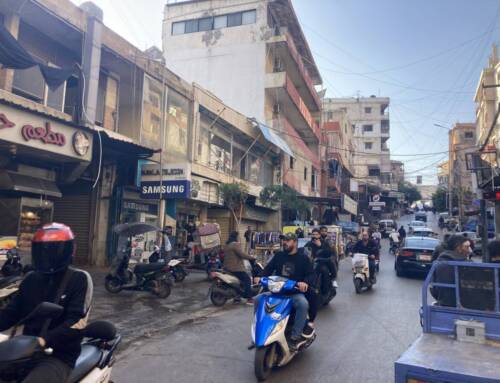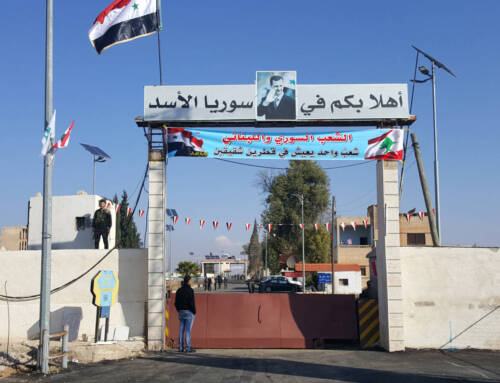Syrian refugees’ growing struggle to access healthcare in Lebanon
Crossing hospital doors in Lebanon is becoming increasingly out of reach for many Syrian refugees.
14 July 2020
Lebanese people exit the emergency section at Rafiq Hariri University Hospital in Beirut, 20/3/2020 (AFP)
BEIRUT – Crossing hospital doors in Lebanon is becoming increasingly out of reach for many Syrian refugees. In theory, they have access to free or subsidized healthcare, but the economic crisis and the structural constraints – like the limitation on their freedom of movement – challenge their access to healthcare.
Primary healthcare for Syrian refugees is covered by several humanitarian actors while hospital care is based on a cost-sharing model. Syrian refugees pay the first $100 of the hospital bill and, beyond that amount, UNHCR covers 75 percent of the cost up to a limit of $15,000. In previous years, less than 0.1 percent of the bills exceeded this ceiling, UNHCR spokesperson, Lisa Abou Khaled, told Syria Direct.
Last June, Intesar Kalla, a Syrian refugee originally from East Ghouta and living in the Beqaa Valley (in eastern Lebanon), had to hospitalize her elderly father due to a cardiovascular emergency. Her father spent five days in intensive care, costing her 3,400,000 Lebanese Pound (LBP), or $2,266 at the official exchange rate. UNHCR covered 75 percent of it but she couldn’t afford her share (850,000 LBP, around $566 at the official exchange rate). “I did not have the money so I borrowed to pay the bill,” she explained. On average, the level of debt per displaced Syrian household in 2019 reached $1,115, an increase of 5 percent compared to the previous year, UN data shows.
Given the dire economic situation, “UNHCR is currently considering a change to the cost-sharing scheme to adapt to the current financial situation of refugees,” said Abou Khaled. This cost-sharing scheme, though, only applies to Syrian refugees registered with the UNHCR, around 920,000 of the estimated 1.5 million Syrians in the country. Those unregistered have to cover the full cost, a chimera for the 80 percent of Syrian refugees in Lebanon surviving on less than $2.9 per day, according to the UN World Food Program.
As a result, many avoid going to the doctor unless it is an emergency. “People are less likely to go to a primary health center (PHC) to seek care unless they have a health emergency and are more likely to prioritize food and rent at a time where their income is being reduced,” Aria Danika, Deputy Head of Mission and Advocacy Manager at Doctors Without Borders (MSF) Lebanon, told Syria Direct.
“Syrian refugees will be prevented from going to hospitals and seeking treatment if they know that they cannot paxy for it,” added Marie Forestier, Refugee Rights Researcher for the MENA Region at Amnesty International.
In 2019, 90 percent of displaced Syrian households in Lebanon were able to receive the needed primary and 81 percent were able to receive hospital care, according to UN data. However, the percentage of those mentioning doctors’ fees as the main hindrance for not receiving medical care increased from 53 percent in 2018 to 75 percent in 2019 at the primary health care level and from 69 percent to 80 percent at the hospital level in that same period.
Some hospitals have been confiscating the identity documents of Syrian refugees who are unable to afford their medical bills. Between January and April of this year, the Norwegian Refugee Council (NRC) documented 36 such cases, and in June, the NGO Sawa for Development and Aid documented two further cases. This unlawful practice of withholding identification documents on account of a debt constitutes a violation of the “right to identity” enshrined in the Covenant on Civil and Political Rights, according to an NRC briefing note.
In 2016, local media reported that the Al Monla hospital in Tripoli, northern Lebanon, was referred to public prosecution for seizing the body of a deceased patient over unpaid bills. NGOs working in the field have not documented similar cases recently. “The non-release of bodies of deceased family members is extremely rare,” said the UNHCR spokesperson, who added that “in the event complaints of extortive measures become frequent from a specific hospital, UNHCR has the option to no longer approve support to care in said hospital.”
The NRC has recently intervened in 14 cases to mediate between hospitals and Syrian families. In one of them, a hospital in the Bekaa region withheld a Syrian newborn from his family since his caregivers could not pay the 700,000 LBP bill. After the NRC’s intervention, the bill was reduced to 350,000 LBP and the father was able to pay it and take his child home, Lianna Badamo, Information, Counselling and Legal Assistance (ICLA) specialist at NRC Lebanon, told Syria Direct.
Fear of traveling to the hospital
Besides the economic cost, the actual trip to medical facilities is problematic for the 78 percent of Syrian refugees who lack legal residency. “If you don’t have legal residency, you are likely to be subjected to harassment, arrest and detention throughout the checkpoints and arbitrary searches that are practiced by the Lebanese security against Syrian refugees,” said Nadia Hardman, Refugee Rights Researcher at Human Rights Watch.
“The Lebanese government should make very clear that no Syrian refugee would be at risk of being arrested if they go to medical facilities to seek healthcare,” Forestier stressed. Out of fear, Syrians self-limit their movements. “The system in Lebanon generally squeezes refugees so hard that the decision to go to the service provider is sometimes a wholly dream-like scenario,” Hardman added.
General Security’s decision to deport Syrians entering Lebanon “illegally” after April 24 2019 has aggravated this fear. “To the Lebanese government, HRW will continue to advocate against refoulement, forcible returns, because these are illegal under international and Lebanese law,” said Hardman.
Sawa for Development and Aid has been offering assistance in transportation to hospitals to an average of 15 refugees per month. They also offer cash assistance (between $300 and $900) to cover medicines, hospital care and the small fee to access primary health care centers, explained Yousra Saab, Protection Coordinator at Sawa.
But fear doesn’t stop at the hospital’s door. Syrian refugees are “afraid that even if they get treatment, their name and their lack of residency may get recorded somewhere and they may get into trouble later on,” Forestier pointed out.
In addition, “there is no predictability over which document may be asked for by the various healthcare actors,” said Hardman. They may request a certificate that the patient may have lost or never had in the first place and is inaccessible since they can’t go to Syria to get it.
The economic crisis takes its toll on hospitals
The recent struggle to import fuel has increased the daily electricity cuts to such a degree that the biggest public hospital in Lebanon, Rafik Hariri University Hospital, announced on July 6 that they were halting the air conditioning system in the hospital’s offices.
One day later, the Head of the Lebanon’s Syndicate of Private Hospitals – 82 percent of the hospitals in Lebanon are private – announced they would receive “emergencies only, especially dialysis and chemotherapy patients, and other life-threatening cases.” He warned, as reported by the National News Agency, about the closure of hospitals, except for emergencies, if the situation is not remedied within three weeks.
The plummeting of the Lebanese lira, the shortage of dollars, the economic blow of the Covid-19 pandemic and the structural unpaid dues of the government to public and private hospitals, complicates the survival of hospitals and their ability to import medical supplies, as stated in HRW and WFP reports.
In a country where poverty rates are expected to surge to 45 percent this year, according to World Bank figures, Danika is concerned about the additional pressure that public hospitals will face: “People are less able to afford to go to a private doctor, they may go instead to the public health system, and this can place an additional demand that wasn’t there before.”
When you can’t afford –or find– your medicine
In the central Beiruti neighborhood of Hamra, pharmacies struggle to provide medicines for chronic illnesses. Nour, a 25-year-old pharmacist, complained they had no stock of medicines for blood pressure, diabetes and diuretic drugs. “The shortages started one month ago,” she said. A couple of streets away, Tony Faroun had a similar situation in his pharmacy. When asked about the prospect of the future availability of these medicines, he summed it up in one word: “Darker.”
The devaluation of the national currency has rendered imports of medicines unsustainable. Seventy-three (73) percent of Syrians have experienced challenges in accessing medicines, according to a WFP study published last May.
“If the Syrian refugees go to their nearest PHC and they tell them they don’t have this medication, they are not going to be able to afford to go to four or five different centers until they find what they need,” said Danika.
Shortages of medicines are especially problematic for patients with chronic diseases. “If they are not able to sustain their daily dosages as part of their [Noncommunicable diseases] NCD treatment, then they are at risk of becoming unstable and developing further complications,” explained Danika. MSF has a program for ‘unstable patients’, for example those with diabetes or hypertension. Once they are stabilized, they are discharged with a 3-month medication supply to cover possible delays until they are reabsorbed by the public health system. Unfortunately, many are returning to MSF centers saying they cannot access their medication.
Some are adopting negative coping mechanisms like “taking half the dosage to try to make it last longer, sharing with a family member and even going months without it,” alerted Danika. In one of her field visits to Tripoli, Danika encountered a case where a family could not access insulin for their 10-year-old daughter with type 1 diabetes. “If you go for a prolonged period of time without insulin, there could be some severe negative health consequences,” she said. She also pointed to the danger of families not vaccinating their children due to economic constraints which could impact the herd immunity of the country.
The obstacle race for access to healthcare in Lebanon is pushing some to seek healthcare in Syria, though these figures are still small: 2 percent of Syrian refugees in Lebanon accessed hospital care in Syria in 2019 according to UN estimates. This trend, though, “is a real concern because it puts these people at risk of being arrested, detained, potentially shot at; crossing the border back and forth is always risky,” said Forestier.
At the Brussels IV Conference in June, $5.5 billion were pledged to support humanitarian needs in Syria and neighboring countries for 2020. “The pledges were below what was required and asked for, which is a worrying trend because needs are extremely high,” said Hardman. She added that besides funding host communities, “the EU needs to step up in their resettlement programs to alleviate the burden that is put on countries like Lebanon,” a burden that is pulling Syrian refugees away from hospitals.
This article reflects minor changes made on 15/07/2020 at 11:45 am.







